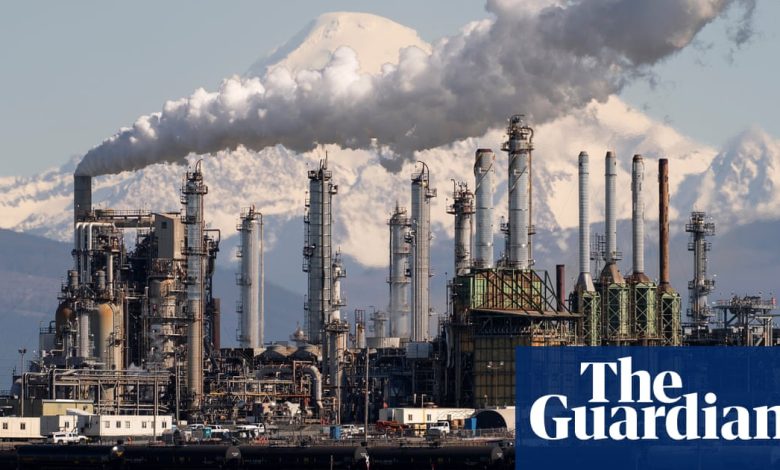Big oil spent decades sowing doubt about fossil fuel dangers, experts testify | Oil and gas companies

[ad_1]
The fossil fuel industry has spent decades sowing doubt about the dangers of burning oil and gas, experts and Democratic lawmakers testified on Capitol Hill on Wednesday.
The Senate Budget Committee held a hearing to review a report released Tuesday by the House Oversight and Accountability Committee that they say demonstrates the industry’s shift from outright climate denial to a more sophisticated strategy of “deception, misinformation and ambiguity.”
“Big oil has had to evolve from denial to duplicity,” said Sheldon Whitehouse, the Rhode Island Democrat who chairs the Senate committee.
The revelations, based on hundreds of newly subpoenaed documents, illustrate how oil companies have worked to clean up their image while fighting behind the scenes against climate policy.
“Time and time again, the largest oil and gas corporations say one thing for public consumption purposes, but do something completely different to protect their profits,” testified Jamie Raskin, the top Democrat on the House Oversight Committee. “Company executives will admit the horrific reality of their business model behind closed doors, but say something completely different, false and reassuring to the public.”
The findings are based on years of investigative reporting and scientific research showing that the sector has been aware of the dangers of the climate crisis for decades but hid it from the public.
In the absence of decisive government action to curb global-warming emissions, the impact of the climate crisis has worsened, panel Democrats said. Several senators said the industry should pay damages for fueling the crisis.
“I don’t think the state government or the federal government should be picking up the tab,” Vermont Sen. Bernie Sanders said. “I think it’s time to ask the people who caused this problem, who lied about this situation, to pay the bill.”
But Republicans on the Budget Committee abandoned the very premise of the hearing. Chuck Grassley, the senator from Iowa and the top Republican on the committee, said it was “undeniable that … fossil fuels are critical to our energy security.”
Meanwhile, Wisconsin Sen. Ron Johnson said CO2 is a “plant food” meaning it has positive aspects. This is a topic of conversation that has been around for a long time promoted by the fossil fuel industry funded think tanks which aim to cast doubt on climate change.
“I’m not a climate change denier, I’m just not a climate change alarmist,” Johnson added.
Curt Davis, director of special investigations at the Center for Climate Integrity, which has long studied climate denial, noted that his rhetoric exemplified “old school” denial tactics that have long fallen out of favor in the industry.
“Plant food was a popular topic of conversation in the 1990s,” he said in an interview. “They fall back on these tropes … and that’s all they have because they have no other rebuttal to the findings of the fraudulent campaigns.”
Perhaps the most tense moment of the morning’s hearing came when Louisiana Sen. John Kennedy questioned Jeffrey Supran, an associate professor at the University of Miami who studies fossil fuel industry communications and whom Senate committee Democrats had invited to testify.
The Republican senator attacked Supran for retweeting posts about protest organization Climate Defiancewhich recently reversed Joe Manchin, the conservative Democratic senator from West Virginia Who has well-documented financial interests in coal and called him a “sick devil.”
after the promotion of the newsletter
“Are you going to call me a sick fuck?” Kennedy asked.
In response, Supran said Kennedy’s comments were “typical” of the oil industry’s “propaganda techniques.”
“Of all the tactics that fossil fuel interests have used over the decades to deny that their products caused global warming, one of the most prevalent is character assassination,” Supran said in an interview after the hearing. “The idea is yes attack the messenger and not the message, because they have no leg to stand on with the message.”
The Republican announcement, Supran added, is an indication that while the industry has embraced new forms of “climate postponement,” older forms of “climate denial are still alive and well in some cases.”
He said Kennedy’s questioning also pointed to “the influence of oil money on American politics,” adding that study shows representatives who fight climate policy get more money than fossil fuel companies. (Kennedy has accepted more than $1.5 million from the oil industry.)
Cities and states filed a numerous lawsuits against big oil for alleged fraud. Sharon Eubanks, who was the lead attorney for the US in a successful lawsuit in 2005 against big tobacco and was invited by Democrats to testify, said the U.S. could also reasonably take legal action against the oil industry.
In her testimony, Eubanks referred to a document called the Global Action Plan for Climate Science Communications, dubbed a “victory note” by climate-denial researchers. Distributed by the leading oil and gas lobby group the American Petroleum Institute in 1998. The document detailed a plan to undermine climate science and promote doubt and denial.
One part of the plan, Davis noted, is aimed at U.S. officials.
“They are specifically targeted and the companies have spent money on congressional propaganda,” he said. “They do the industry’s work for them.”
[ad_2]




